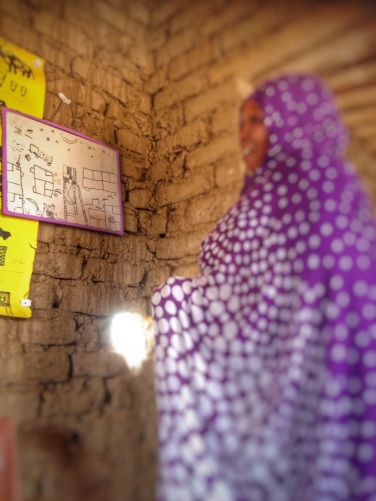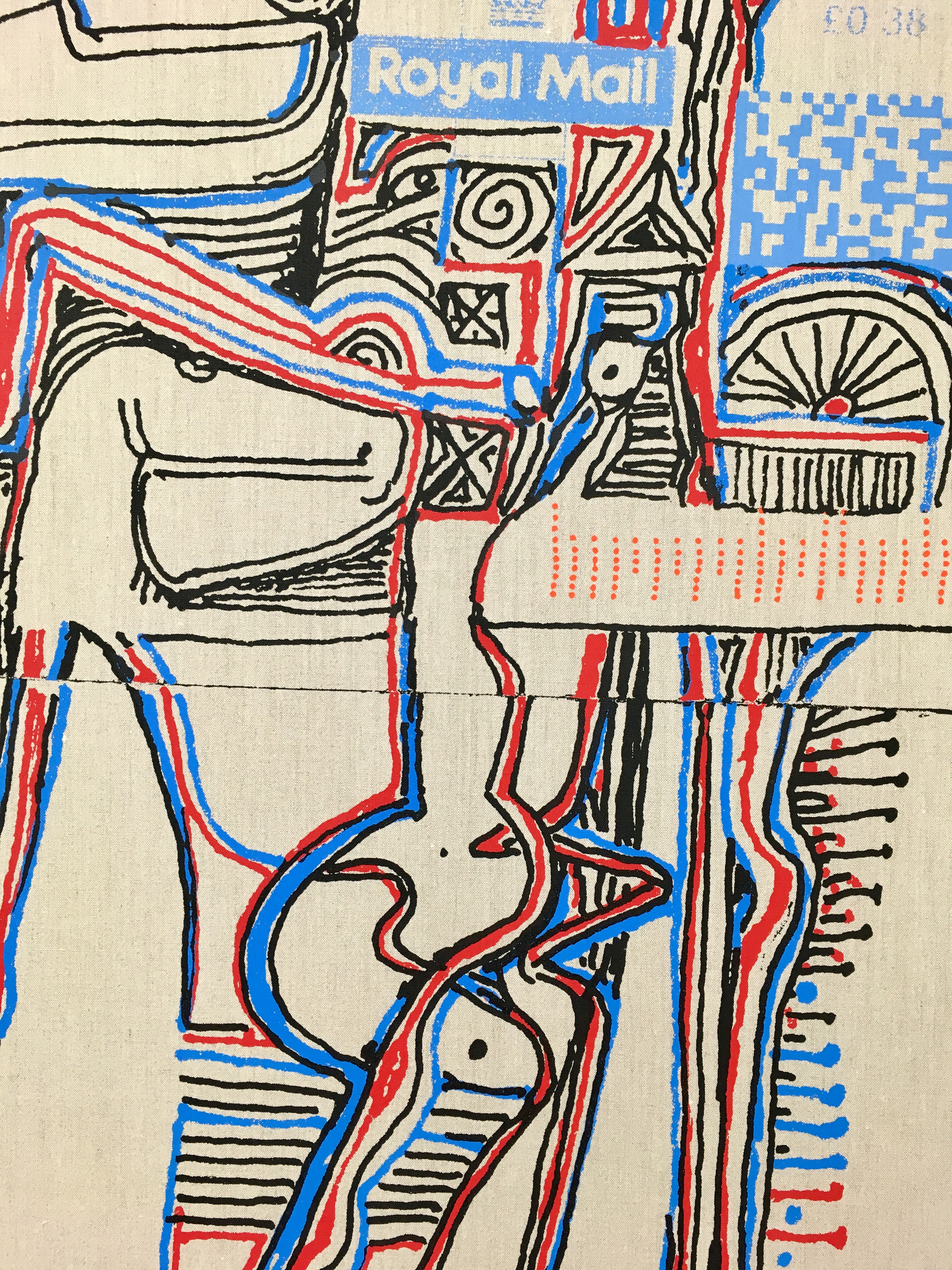
Literacy circle in Jebel Aulia, Khartoum

Human Rights Training through Literacy

All photographs of WEP’s literacy work in this blog are copyright Imogen Thurbon and may not be reproduced without written permission
Community Literacy and REFLECT
The literacy work of Women’s Education Partnership is based on a community-centered, participative methodology which draws on the knowledge and practical needs of local people. The method, known as REFLECT or ‘Mirror’ in Arabic, was introduced into Sudan in 1998 and evolved out of Rural Participative Appraisal developed by Paolo Freire and others. See Literacy Circles in Action

The Pamoja REFLECT Network Sudan brings together Sudanese practitioners and trainers in the REFLECT method and is dedicated to advancing community development in Sudan. One of its founders, Dr Leila Bashir, is closely involved in the training of facilitators at Women’s Education Partnership and has been instrumental in the design, content and editing of our training manual.

How does REFLECT work?
It is the women attending community literacy circles who determine the written language and numeracy skills they wish to acquire through a negotiated focus on issues of direct relevance to them and their community. Progressing from visual representations in the form of maps, charts, diagrams and drawings of their home, workplace, domestic and work activities and community resources, they move on to express key ideas, schemata and relationships in a written form. This process acts as a vehicle for personal and community development and change as issues are continually debated and discussed in an open and respectful group dynamic.

Discussing annual household income and expenditure
Adult learners often find the REFLECT method a refreshing and stimulating alternative to more traditional, text-based literacy programs as it draws more actively on their deductive skills and their wealth of knowledge and experience of the world. They are treated as equals with valuable knowledge and insights to bring to the group.
https://www.actionaid.org.uk/sites/default/files/doc_lib/190_1_reflect_full.pdf

Illiteracy rates are highest among older women
While there are many high quality free access online resources offering detailed frameworks and training materials for facilitators, REFLECT nevertheless requires substantial investment by those involved in budgeting and funding for literacy if it is to effectively deliver its literacy and community development goals. This is because the effectiveness of its programs goes hand in hand with the quality of training provided to its facilitators and the strong skills base they in turn need in order to lead and encourage dialogue and independent approaches to learning and community change.



Interested in supporting our work? Visit Women’s Education Partnership
Challenges Inherent in the REFLECT Approach
As with all methodologies, REFLECT has its drawbacks and its implementation and assessment pose particular challenges. Abby Riddel in A Review of 13 Evaluations of REFLECT, Action Aid, 2001, sums up the complexities involved in adopting an methodology which is so much more than just teaching reading and writing:
“What distinguishes REFLECT from other adult literacy programmes is the direct connection it has with community development. Community development is not as something that is done with literacy after it is acquired, but rather community development permeates through the literacy training. For REFLECT to serve the multiple purposes that are expected of it however, frequent evaluations have to be made; the information they give is used to plan further interventions so as to improve implementation and enhance outcomes.”(Abby Riddell 2001, p.69)
She goes on to warn that if “practitioners do not want to be judged on their ability to produce literate and numerate participants, then they must be judged on their ability to produce empowered, self-confident communities”. This raises the key question of how far facilitators really integrate literacy into broader development aims and how far those aims are sidelined by facilitators in favour of technical literacy skills.
In many of our monthly reports submitted by Mrs. Adila Abdel Rahman, the tensions between what some facilitators see as discrete aims is very evident. Some facilitators, though trained extensively in the holistic aspects of REFLECT, are in practice delivering something more akin to standard traditional literacy classes. How to strike a successful balance between the social, practical and technical skills needed by literacy circle members is also a key challenge.

El Fatih Literacy Circle
In the same way, REFLECT’s own ideological underpinnings about gender equality may need to be carefully contextualised in the interests of cultural sensitivity.

REFLECT and Empowerment for Women
Many claim that REFLECT literacy approaches feed positively into development work on gender equality. Studies indicate that REFLECT has been found to enhance women’s mobility both in terms of traveling within their community and in their ability to move from private to more public arenas within their community as their self confidence grows. Discussing and mapping out traditional male and female workloads during literacy sessions can bring about shifts in perceptions of gender roles, though it is still to be established how sustainable and long lasting such changes in perception are and whether they translate into practical change in distributions of workload. Reflect is extremely sensitive to local cultural norms and a central tenet of reflect is there should be no imposition of values on its participants. This is very much the case in Sudan where all focus on gender issues is framed within the context of prevailing religious and cultural understandings of gender roles.
I certainly felt that the women I spoke to in our literacy circles believed themselves to have been empowered by their experiences in the circles and this had changed their lives in many ways. Some had gone on to initiate community health projects; others had enrolled in vocational courses or had become more actively involved in the education of their children. All of them expressed their views with clarity, focus and self-confidence. One had found the courage to report the physical abuse of her daughter to the authorities after growing in self-confidence and becoming more aware of community structures and institutions that allowed her to do so safely.

![]()
I work with my hands and will never call anyone my master.

Interested in supporting our work? Visit Women’s Education Partnership
The REFLECT Trainer
At the core of REFLECT’s approach to literacy and community development are the dialogue developing skills of its facilitators and their ability to identify and develop community leadership skills among participants. Facilitators need regular high quality training and refresher input and the infrastructures in place which allow them to share experiences with other trainers regularly and to maintain their motivation in what can feel a sometimes lonely environment. However the reality is often that the training of facilitators is limited, piecemeal and poorly resourced. Too often the only measure of the quality of the sessions is deemed to be attendance. The need for facilitators who come from the same community as their participants, who speak the participants’ mother tongue if different from the target literacy language, and who can empathise with the community’s stresses and challenges, cannot always be met.

Discussing local infrastructures
I was struck by the fact that in many of our circles, participants commented that what kept them coming when work and family pressures were acute, was the personal empathy and concern for their wellbeing expressed by their facilitator, who would call on them to check if they were well if they missed a session. This echoes formal research findings on the importance of empathy and caring in assessing literacy trainer competencies.

The Challenges Ahead
If its radical community development and empowerment aims are to be realized, REFLECT circles and the organisation that provides them need to be strongly embedded within the community they serve and foster links with the larger community. They also need to forge strong links to national health, education and welfare bodies. A fair and rigorous appraisal of what REFLECT literacy programs achieve, both in terms of literacy acquisition and community empowerment, is difficult to put in practice and organisations often lack the funds and infrastructure to pursue assessment and follow-up adequately. In this Women’s Education Partnership is no different from many other NGO’s operating in the field, for whom investing time and resources in the recruitment of skilled facilitators, overcoming bureaucratic complexities, being able to physically visit and monitor their work on a regular enough basis to be meaningful and providing the opportunities for staff to meet, share and grow in their REFLECT skills often has to take precedence over longer term aims.

Women’s Education Partnership is grappling with many of the challenges outlined above and has a long way yet to go towards resolving many of these issues, not least that of evaluating the impact of our literacy work on long term community empowerment and in fully providing training support and development networks for our facilitators.
It is easy to become pessimistic in a field where it is often said that 70% of projects fail but while acknowledging that we still have a long road to travel, my own observation of the circles we run gives me great cause for optimism as the experiences and testimonies of our participants bear witness.

Interested in supporting our work? Visit Women’s Education Partnership
This article is an abridged version of Challenges to Literacy and the Role of Women’s Community Literacy Networks in Sudan, Imogen Thurbon, first published in SudanStudies for South Sudan and Sudan, March 2018, Number 57. Full article here: SS57_Thurbon

Literacy Circles in Action The Power of Folktales Training the Trainer Voices Literacy and Development Links


